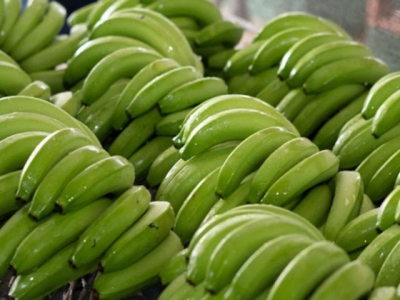Vietnams bananas imported into Japan continue to increase sharply

Vietnam’s bananas imported into Japan are on the uptrend over recent years in both quantity and value, especially during the first 10 months of 2021.
Vietnam is the fifth-largest supplying market of bananas for Japan. Photo: TL.
According to the Japan Customs Service, Japan’s import of bananas over 10 months of 2021 reached 939.8 thousand tons, worth 93.6 billion Yen (equal to USD 822.8 million), up 4.7% in quantity and 3.5% in value over the same session of 2020.
The average price of imported bananas is 99.6 thousand Yen/ton, decreasing 1.2% over the same session of 2020.
In the structure of banana supplies for Japan, the Philippines is the largest supplying market, accounting for 75.8% of the total amount of bananas imported by Japan over the first 10 months of 2021, followed by markets such as Ecuador, Mexico, and Guatemala.
Vietnam is the fifth-largest supplying market of bananas for Japan, the quantity imported and the import value all rose sharply in this year.
Over 10 months of 2021, Vietnam’s bananas imported into Japan reached approximately 6 thousand tons, worth 643 million Yen (equal to USD 5.7 million), up 59.5% in quantity and 27.9% in value.
The proportion of banana imports from Vietnam accounted for 0.6% of Japan's total banana imports, up 0.2 percentage points over the same period in 2020.
The average price of imported bananas from Vietnam is high, over the first 10 months of 2021, it reached 107.6 thousand Yen/ton, decreasing 19.8% over the same period in 2020.
According to the Agency of Foreign Trade (Ministry of Industry and Trade), the banana is one of the most popular fruits in the world.
In Japan, bananas are commonly sold in supermarkets, convenience stores, and grocery stores. Each household in Japan consumed nine to fifteen bananas a month. Japan's banana productivity therefore seems to fall short for general consumption, making this country mainly import bananas from countries worldwide.
Related news
 Bình Thuận strives to optimise protected GI of dragon fruit in Japan
Bình Thuận strives to optimise protected GI of dragon fruit in Japan The acquisition of a protected geographical indication (PGI) certificate in Japan for dragon fruit is a success for south-central Bình Thuận province
 VnSAT builds the sustainable coffee value chain
VnSAT builds the sustainable coffee value chain Due to the VnSAT project, Phuong Hoang Cooperative (Duc Co district, Gia Lai province) has become a model in sustainable coffee value chain development.
 Japonica rice - from ‘stranger’ to ’close friend’
Japonica rice - from ‘stranger’ to ’close friend’ Since the rise of quality commodity rice, Hanoi’s ten million citizens have now changed from ‘eating to fill one’s stomach’ to ‘eating to fill one’s palate’.